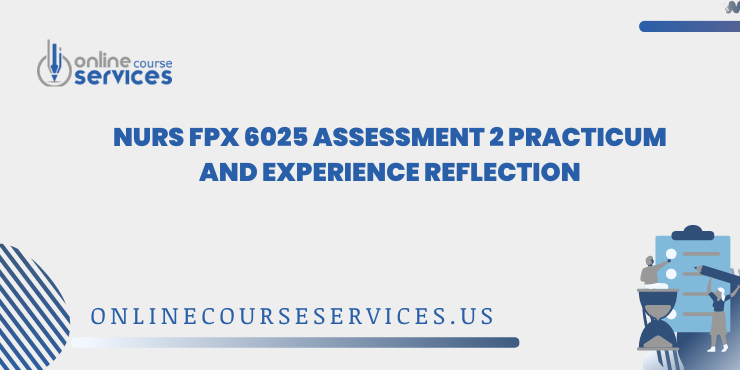
NURS FPX 6025 Assessment 2 Practicum and Experience Reflection
I had the opportunity to be involved in my practicum work at [insert name of practicum site] healthcare facility, which is known to provide high-quality patient care. I was given a chance to achieve my experiences. I performed the clinical assignment actively by implementing patient assessment, treatment planning, and evidence-based interventions. Through the mentorship of my healthcare providers, I have gained critical thinking and fundamental clinical skills by engaging in actual healthcare practice with theoretical knowledge in a practical setting.
I have learned innumerable things while working with different staff groups of healthcare service providers and have also developed a strong understanding of the significance of communication in healthcare. Another thing to look at is that I have participated in this observation and group discussion with patients, which has endorsed health promotion and disease prevention (Melariri et al., 2023). As a result of these activities, I have realized the importance of a comprehensive strategy in providing medical care to patients and why the role of nurses as promoters of good health outcomes cannot be underestimated.
My preceptor, with all of the say, might be a factor in initiating my learning experience. Still, he is more of an instrumental mentor and guide throughout my practicum journey. The fact that they cheered me up at hard times and gave me all notions on improving things has made me step out of my comfort zone take up some challenges and grow personally and professionally. The common bond in nurse-to-nurse discussions is the shared interest in learning and the collective effort to achieve it. My counterparts have always been willing to share their knowledge, provide constructive feedback, and support me in navigating the complexities of clinical practice and achieving my learning goals.
Preceptor Role as a Mentor and Supervisor
My preceptor and his/her practice of being a mentor and site supervisor are outstanding because they consistently give instructions and support during my practicum. They have made the place a welcoming and understanding workspace where I can ask questions about clinical tasks or professional concerns. I feel free to seek advice and clarification. Whether leaving me on my own to conduct a formal teaching session or sitting with me engrossed in informal discussions to help me alleviate my doubt, the preceptor is always accessible to provide helpful guidance and to share their knowledge with me.
My knowledgeable preceptor also took me to different areas of study and activities to develop my clinical skills and knowledge. They keep me up-to-date with new and challenging tasks that need to incorporate direct teaching, in which they demonstrate the desired performance. The preceptor radically nurtures a learning environment by giving constructive feedback and encouragement. This culture of continuous learning and professional development effectively discreetly grows my capacities and confidence as a nurse (Mlambo et al., 2021).
They also go beyond me by setting a learning plan for me through reflection and identifying the barriers. Their exemplary ethics, productive communication, and patient-focused care patterns in handling patients, families, and colleagues exemplify professional excellence. The preceptor is an admirable example of demonstrating these qualities and mentoring me to pursue perfection in my profession.
Goals and Objectives of Practicum Experience
The practical training experiment goals and objectives will help me build up my online brand because that will reflect on my degree program’s success. These objectives are very constructive as they are formulated to comply with the learnings of the practicum – vital in acquiring real-world clinical experience, extending clinical skills, and placing theoretical knowledge gained from classrooms into actual problem-solving situations (Anjum, 2020). Analysis of these goals and objectives will enable me to assess their effectiveness in reaching my educational goals.
My aims and objectives of this practicum are formulated within the SMART framework, making their measurement and evaluation easy by determining my success and achievement until the end of the practicum. Objectives are always accompanied by measurable outcomes that act as benchmarks compared to the success metrics. They enable me to keep track of improvement levels and assess what needs to be changed to remain on track to accomplish the goals.
The successive goals and objectives are appropriate to my practice and career plan, allowing me to gain direct experience in my field. This way, I can serve my purpose through the practicum experience. My ability to focus on my professional goals will adjust my expertise to align with my personal development and preparation for becoming the best nurse I can be.
Completion of Hours
I accumulated [insert number] practicum hours through my CORE practicum log. My CORE ELMS hours log indicates that I have accomplished the total number of practicum hours. This is when the students learn various activities within the medical genre, ranging from patient checks to treatment plans and working in collaborative health teams. Interning alongside professors, attending simulations and clinical in a medical center, and volunteering at the coronavirus mobile clinic have fulfilled the requirements, introducing me to the crucial skills and knowledge that allow me to advance as a professional and caring nurse.
References
Anjum, S. (2020). Impact of internship programs on professional and personal development of business students: A case study from Pakistan. Future Business Journal, 6(1). springeropen.
https://doi.org/10.1186/s43093-019-0007-3
Melariri, H. I., Kalinda, C., & Chimbari, M. J. (2023). Patients’ views on health promotion and disease prevention services provided by healthcare workers in a South African tertiary hospital. BMC, 23(1).
https://doi.org/10.1186/s12913-023-09351-5
Mlambo, M., Silén, C., & McGrath, C. (2021). Lifelong learning and nurses’ continuing professional development, a meta-synthesis of the literature. BMC Nursing, 20(62), 1–13.
https://doi.org/10.1186/s12912-021-00579-2
If you want to explore more information about in class assessments click below to view:
NURS FPX 6025 Assessment 3 Practicum and Scholarly Article